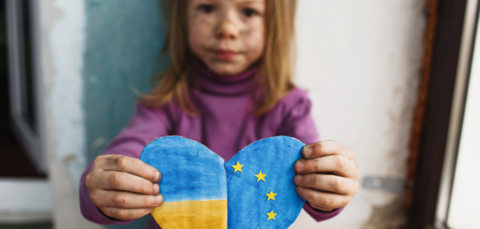Eurochild has published two new pieces of analysis to support efforts by the EU and the Ukrainian government to ensure the care of children arriving from Ukraine unaccompanied, separated from their families or who are placed in alternative care.
Building on Eurochild’s DataCare project with UNICEF ECARO, Eurochild is supporting UNICEF’s emergency response work to the invasion of Ukraine to support coordination efforts with the Ukrainian Ministry of Social Policy, the EU and Member States to address issues facing unaccompanied and separated children fleeing Ukraine and arriving in the European Union (EU).
The first analysis is a Discussion Paper on guardianship, care arrangements and custodial responsibilities for unaccompanied and separated children fleeing Ukraine and arriving in the European Union written by Child Circle, a centre of expertise on EU child rights and child protection policy, with a focus on children in migration and child victims of violence.
The discussion paper addresses issues facing unaccompanied and separated children fleeing Ukraine and arriving in the European Union (EU). In particular, it focuses on the priority issue of how care and custodial arrangements and guardianship under child protection and migration measures are established within EU Member States. This question has implications for how children access protection, how information on their circumstances is managed and ultimately how durable solutions are identified and secured for children.
In parallel, Eurochild has carried out an urgent mapping, with support from its members, UNICEF country teams and government representatives across 13 countries. The mapping examines the laws and policies at national level for children in alternative care and unaccompanied and separated children from Ukraine who arrive in the following countries:
- Czechia
- Estonia
- Germany
- Greece
- Hungary
- Italy
- Latvia
- Lithuania
- Poland
- Romania
- Slovakia
- Spain
- United Kingdom
The mapping has looked at a range of issues, including guardianship, and is contributing to explorations between the Ukrainian government, EU Member States and the EU on mechanisms for cooperation between them for the temporary protection, care and eventual return of unaccompanied children.
Together, these outputs are informing how EU action, in particular the Solidarity Platform, but also other EU and regional action including initiatives as appropriate, can support Member States and other stakeholders to address common questions of concern and face challenges, while keeping the best interests of the child at the centre of all actions.
For more information, please contact Ciaran O'Donnell, Policy & Projects Officer.

